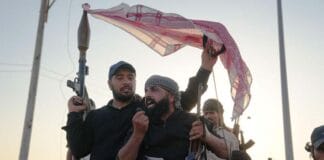The Arab Spring, four years ago a source of inspiration and hope across the Middle East, has given way to a wave of counter revolution, sectarianism and war.
General Al Sisi has drowned Egypt in blood; there is complete dysfunction in Libya and sectarian civil war across Yemen, Iraq and Syria.
But in recent months, new upsurges in struggle have taken place in Iraq and Lebanon—two of the countries most wracked by sectarianism. They are showing that the sectarian politics can be challenged—and point to a way out of the impasse.
In Iraq, the US occupation left behind a sectarian state under Nouri Al-Maliki between 2006 and 2014. This fuelled the rise of Islamic State (IS) in the Sunni west of the country.
Now amidst a blistering heatwave, massive popular demonstrations uniting people across religious and sectarian divides have taken place in Baghdad’s Tahrir Square and in several cities in central and southern Iraq.
The protests, which have attracted hundreds of thousands of people, were triggered in mid-July when the security services and Shia militia linked to the government put down a protest north of Basra over a lack of electricity and water, shooting dead Muntazar al-Hilfi, a young student, and leaving another four protesters wounded.
The movement has condemned continuing power outages, deteriorating public services and increasing inequality. Over 35 per cent of Iraqis live below the poverty line.
In addition, they have denounced corruption and the bankruptcy of the ruling sectarian political parties. The protests have been young, with the involvement of many women, and also many of Iraq’s large community of people with disabilities.
The movement has already forced significant political concessions from Prime Minister Haider al-Abadi, including a pledge to reform Iraq’s sectarian quota system.
Other promised reforms include reducing the size of his government by a third, reduced security for government officials and MPs, as well as reducing their salaries.
Meanwhile, since mid-August, Lebanon has seen mass demonstrations against the government’s market-based approach to waste disposal and treatment. The movement, mobilising under the hashtag #Youstink, has condemned this environmental disaster, and its disproportional impact on the poorest regions of the country.
The closure of the open-air landfill site in Na’ameh following local protests meant that tons of rubbish were left on the streets of the country’s major cities. The regime proposed to open another landfill site in the impoverished region of Akkar. It also transported some of the garbage heap to poor areas as a temporary solution, while gentrified neighbourhoods were unaffected.
Tens of thousands of people have repeatedly come onto the streets in protests and sit-ins, sometimes braving tear gas, water cannon and police batons. Hundreds of people have been injured or arrested.
Against sectarianism
The protests quickly generalised to criticise everything from the lack of basic infrastructure to the corruption and nepotism of the political class, calling for the resignation of the ministers of the interior and environment.
The protests have also demanded an end to the sectarian religion-based power sharing arrangement. Seats in parliament and the offices of speaker, prime minister and president are parcelled up among the various Christian and Muslim sects according to a quota.
Youstink organisers rejected a plan for a supposedly sustainable solution that would temporarily reopen existing landfills until new ones can be built elsewhere, by protesting alongside residents in areas where landfills exist or are earmarked for construction.
They have similarly condemned the national dialogue initiative aimed at ending the political vacuum of the past 16 months. They have denounced its participants as “feudal patriarchs” and “self-appointed mafia leaders,” demonstrating outside all three sessions held so far. The dominant sectarian political groupings—the Saudi-backed March 14 coalition and the March 8 coalition supported by Iran and Syria—continue to squabble over who will be president.
While some moderate Youstink leaders have sought to prevent the radicalisation of the movement, a new left, progressive front called “The People Want” has been established under the slogan “secularism, equality and social justice”.
The uprisings in Iraq and Lebanon may not be on the scale of the Arab Spring revolutions. Yet they both show that mass movements against corruption, for decent public services and better wages can unite working class people across sectarian divides. They point a way forward, and have the potential to rejuvenate popular struggle across the whole of the Middle East and North Africa.
Moreover, they also show that the same economic and political demands that sparked the 2011 uprisings—for democracy, freedom and social justice—remain as relevant as ever.
By Mark Goudkamp





